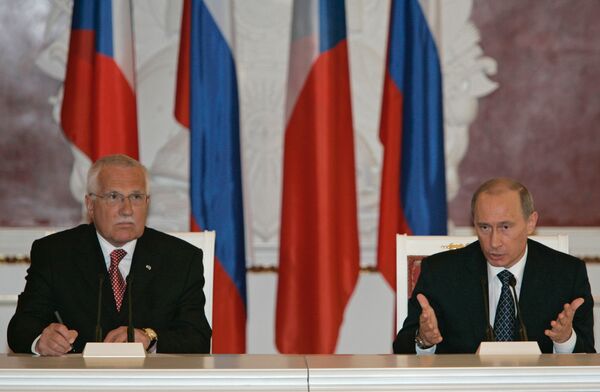MOSCOW. (RIA Novosti commentator Dmitry Babich) - Czech President Vaclav Klaus, the biggest Euro-skeptic of the Old World, is coming to Russia.
The official purpose of his visit is to strengthen Czech-Russian relations. It is possible that an agreement will be signed to create a Russian-Czech consortium for participation in a tender to build two new generating units at the Temelin Nuclear Power Plant in the Czech Republic. The Czech company Skoda JS and the Russian companies Atomstroyexport and Gidropress would participate in the consortium.
Temelin, which is equipped with two Russian VVER-1000 reactors, has more than once been the object of attention of the environmentally-obsessed European public, which is convinced of the danger of not only Russian reactors but of the danger of anything that originates in Russia. Experience has shown that these fears are groundless but can sometimes yield fairly good electoral dividends.
But Klaus would not be Klaus if he let someone's prejudices stop a good project. One of his favorite occupations is to say that black is white and vice versa even in those cases where it goes against the grain of popular opinion. And since popular opinion in today's European Union (EU) is often of a superficial nature (and, alas, simply paranoid with regard to issues involving Russia), the terse sentences of this elder statesman with a piercing gaze often find a grateful audience outside the Czech Republic.
"The Russian leadership is a normal partner," "Global warming is a fabrication of special interest parties" - these statements from Klaus, uttered during his recent visit to the U.S., produced reactions of shock and awe among audiences.
Now Klaus is practically alone in opposing the Lisbon Treaty - the new EU "charter" - intended to force this strong but bureaucracy-ridden organization to speak with one voice (with the post of president to be more than likely taken up by one of the main architects of the wars in the former Yugoslavia and in Iraq, Tony Blair). The Czech Republic is currently the only country that has not ratified the Lisbon Treaty.
In addition, Britain's Euro-skeptics have come forward with an open petition signed by 8,000 Europeans which asks Klaus to hold out until spring 2010. During this time, the U.K. will hold elections in which Conservative David Cameron is expected to win. Cameron has promised to hold a referendum on the Lisbon Treaty, which will more than likely stop it dead in its tracks and scuttle it for good.
Nevertheless Klaus said that he could not fulfill all of the wishes of British opponents to the Treaty, who should have planned ahead. The Treaty is currently under legal review in the Czech Republic's Constitutional Court. Klaus' allies from the Czech Senate have been sent to review it. Due to the outcry from ultraliberal British and German publications, the court has agreed to expedite the review process. After this procedure, Klaus will have to sign the Treaty, even though he admitted in one interview, that in reading the 300-page document, it turned out to be "worse than I thought."
Klaus has a series of impressive accomplishments with regard to the new democratic Czech government. Therefore, he is not shy about expressing his opinion. For example, he dares to say that communism in Czechoslovakia "fell apart on its own" 20 years ago and was not subject to the heroic efforts of dissidents. By uttering this truth, Klaus made many enemies among those who for many years made careers of a not very noticeable "struggle against the communist regime."
Incidentally, it was Klaus, and not the author of little-read plays Vaclav Havel, who guided the process of the transformation of the Czech Republic in the 1990s. President Havel's role at the time was reduced to ceremonial bystander. Obviously, Havel still cannot forgive Klaus for this. This is the source of Havel's overt dislike of Klaus and U.S. President Barack Obama and the smear campaign in the Czech press against "agents of Moscow" in the corridors of power as well as those attempting to roll back the U.S. anti-ballistic missile system in the Czech Republic. When a rejection of the shield came not from Moscow but from Washington, all Havel could do was fume.
In due course, the European press, which was literally fawning over Havel, is now blasting Klaus. "Europe is threatened with a new Berlin Wall because of Klaus!" clamored the German newspaper Rheinische Post. A black-and-white view of the world, where Moscow is black and Brussels is white, sells well. But it looks like Klaus is in no hurry to join the color-blind majority.
The opinions expressed in this article are the author's and do not necessarily represent those of RIA Novosti.

